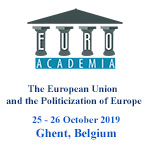Euroacademia Conferences
 Europe Inside-Out: Europe and Europeanness Exposed to Plural Observers (9th Edition) April 24 - 25, 2020
Europe Inside-Out: Europe and Europeanness Exposed to Plural Observers (9th Edition) April 24 - 25, 2020 Identities and Identifications: Politicized Uses of Collective Identities (9th Edition) June 12 - 13, 2020
Identities and Identifications: Politicized Uses of Collective Identities (9th Edition) June 12 - 13, 2020 8th Forum of Critical Studies: Asking Big Questions Again January 24 - 25, 2020
8th Forum of Critical Studies: Asking Big Questions Again January 24 - 25, 2020 Re-Inventing Eastern Europe (7th Edition) December 13 - 14, 2019
Re-Inventing Eastern Europe (7th Edition) December 13 - 14, 2019 The European Union and the Politicization of Europe (8th Edition) October 25 - 26, 2019
The European Union and the Politicization of Europe (8th Edition) October 25 - 26, 2019 Identities and Identifications: Politicized Uses of Collective Identities (8th Edition) June 28 - 29, 2019
Identities and Identifications: Politicized Uses of Collective Identities (8th Edition) June 28 - 29, 2019 The European Union and the Politicization of Europe (7th Edition) January 25 - 26, 2019
The European Union and the Politicization of Europe (7th Edition) January 25 - 26, 2019 7th Forum of Critical Studies: Asking Big Questions Again November 23 - 24, 2018
7th Forum of Critical Studies: Asking Big Questions Again November 23 - 24, 2018 Europe Inside-Out: Europe and Europeanness Exposed to Plural Observers (8th Edition) September 28 - 30, 2018
Europe Inside-Out: Europe and Europeanness Exposed to Plural Observers (8th Edition) September 28 - 30, 2018 Identities and Identifications: Politicized Uses of Collective Identities (7th Edition) June 14 - 15, 2018
Identities and Identifications: Politicized Uses of Collective Identities (7th Edition) June 14 - 15, 2018
European Social Thinking and the “Other”
-
-

-
Presentation speakers
- Dolores García, Department of Humanities of University CEU-San Pablo, Madrid, Spain
Abstract:
It is the belief implicit in this paper that the patrimonial European identity can be conceived as an experienced identification with different cultures from which many individuals extract and share feelings of belonging. In the search for the European path ahead, philosophers have been exploring different approaches. The purpose is, firstly, bringing some little-visited approaches (Hanna Arendt, Simone Weil or Maria Zambrano) in a complementary manner and to replace the previous deductive method of modern ideologies with a more inductive bottom-up process that harvests, from their different essential contributions, a better understanding of the “other”. Secondly, it is suggested that the contemporary recognition of Europe should be placed more firmly within this tradition of aspiration for fraternity, putting into goal more in the people that in the institutions of the society that put up the walls of their cognitive closure. This is because, usually, fraternity is not considered as a premise and it could be not only the missing premise but a contribution of European culture. Finally, we consider the important role of critical thinking and philosophy to place the Europeanness in touch with its cultural elements and question historically circumstantial projects of political appropriations of identitarian claims, but my concern is especially, to identify new modes of critical thinking from social philosophy in order to analyze the cultural identity and human resources for the understanding of the persons as active participants in the new global world. Together, these perspectives could provide a mutual reinforcement in which could lay a new commitment of the search for the European path ahead.
-
Related Presentations

#Portichiusi: The Human Costs of Migrant Deterrence in the Mediterranean
- Michele Cantarella

Europeans by the Polls. What Voter Motivation Tells Us about EP Accountability
- Dorian Alt
- Erik Brandes
- David Nonhoff













